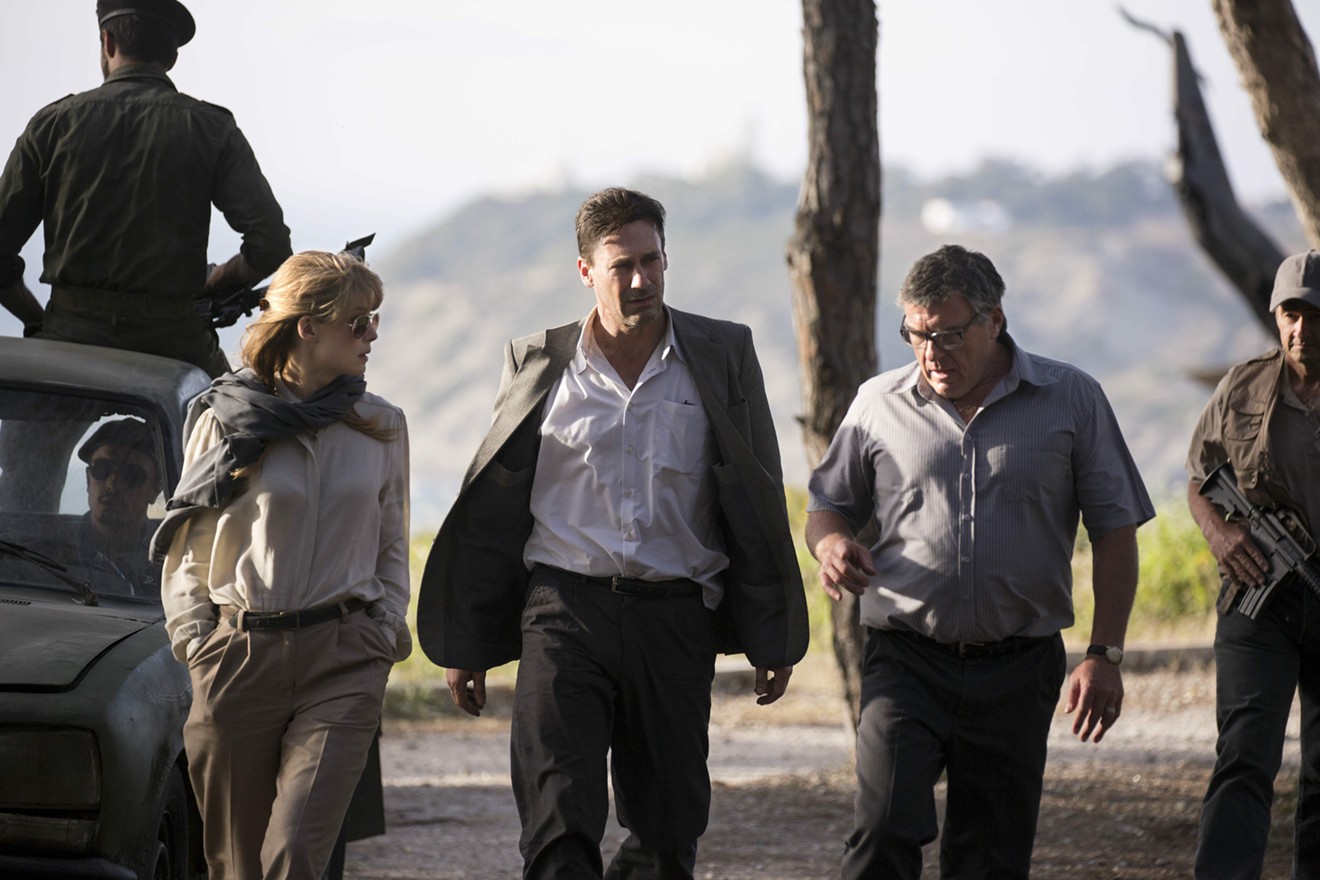Hollywood hasn’t known what to do with Jon Hamm since Mad Men, probably because Hollywood doesn’t make many movies about grown-ups. That’s especially true for grown-ups like the men Hamm is so adept at embodying: handsome, hyper-competent lugs whose handsomeness and hyper-competence is always edged with doubt. From Don Draper to the sports agent in Disney’s Million Dollar Arm, Hamm’s square-jawed existentialists don’t just worry, privately, over their own failures and secret vices. They face the truth that even that handsomeness and hyper-competence — and the success that both seem to promise — won’t be enough to keep them happy. They’re men smart enough to know that each day the world needs men like them less than it did the day before — but they’re not so smart that they know what to do about it.
Brad Anderson’s talky-smartish thriller Beirut, like the first half of Million Dollar Arm, sets Hamm’s sharpie loose in a country — in this case a fractious Lebanon — where the rules aren’t his. A prologue in the early ’70s establishes he’s in over his head: With glittering disingenuousness, diplomat Mason Skiles (Hamm) works a soiree thick with congress folks and local powers, only to be pulled aside and told that Karim (Yoav Sadian Rosenberg), the refugee boy he and his wife have taken in, is wanted right this minute for questioning about his terrorist brother. The problem is Karim is currently doling out canapes to senators — and Skiles never knew the kid had a brother. Hamm explodes at the authorities outside the party, sticking up for Karim, insisting that a 13-year-old could have nothing to do with it. The pleasure of beholding Hamm’s righteous fury is only undone by the actual explosions that come next.
The main story kicks off a decade later. Despite his distinguished career, Skiles has turned his back on international diplomacy — and, unfortunately, those badass boot-shaped sideburns he rocked in the prologue. But after a miserable day of arbitrating a union-management dispute in a Boston suburb, Skiles gets dragged back in. His former pal Cal Riley (Mark Pellegrino), a CIA agent, has been kidnapped in Beirut, and the feds believe Skiles is the asset to handle it. Since he’s a Hamm character, Skiles goes reluctantly … and soused. And once he’s in the country, he only perks up after grasping the complexity of the situation and realizing that maybe he is the one to balance the many competing interests in the case — the PLO, the Israelis, Beirut’s Christians and U.S. intelligence, which itself has conflicted loyalties and imperatives — and bring Riley to freedom.
Hamm’s not playing a super spy, here. Instead, he’s a canny negotiator, a poker-faced talker who sees more angles than anyone else does. Tony Gilroy wrote the script, splicing together elements he’s expert in: Here are the tense and savvy colloquies of Michael Clayton or Duplicity brought into the street-level, race-against-time thriller world of his Bourne films. But don’t expect brawls and shoot-outs as Skiles navigates Lebanon's civil war. Hamm’s not given to violent heroics, and everyone in the movie (and behind the camera) is smart enough to understand that the usual Hollywood gunplay would get everyone involved killed. In one sense, the film and Hamm’s performance is pleasingly old-fashioned; like Joseph Cotton’s Holly Martins in The Third Man, Skiles even has to give an impromptu lecture in the war-torn city where the politics might kill him. But Hamm, at his best (as he is here), suggests the contemporary anxieties that roil beneath his classic good looks. His Skiles gets outfoxed by Beirut in the prologue, and for the rest of the movie he’s terrified it might do so again. He recognizes that it was hubris to have presumed that an outsider could master this city. Here, that Hammish doubt is smartly self-preservational.
The pleasure, then, of Beirut is watching Hamm and his associates encounter the conflicting factions at play, work out what’s actually going on, and then find a way to defuse the situation, most likely by getting each involved party what it wants. Inevitably, of course, he must face a past he had tried to put behind him — you’ll probably see this coming several minutes before Skiles does. His team is well-cast: Here are Rosamund Pike (given too little to do), Dean Norris, Shea Whigham and Larry Pine.
Anderson capably handles the showdowns, foot chases and pervasive eeriness of a city in ruins. At times, though, Beirut slips into Homeland-style shorthand, suggesting there’s not a street in town without a home to religious murders. Meanwhile, the score too often offers a percussive foot-chase clatter caked over with Middle Eastern instruments, resulting in a familiar melange we could call “Muslims Chasing White People.” That points to a larger failing, one of conception: This engaging and intelligent script could have been of both if Beirut made room for the experience of anyone besides the Americans. The filmmakers do memorable work examining what it might take to solve this one particular crisis, but do too little examining the city itself. The title promises something the movie doesn’t deliver. Maybe they should have called it In Beirut rather than Beirut itself.
[
{
"name": "GPT - Billboard - Slot Inline - Content - Labeled - No Desktop",
"component": "16971022",
"insertPoint": "2",
"requiredCountToDisplay": "2"
},{
"name": "Editor Picks",
"component": "15769925",
"insertPoint": "4",
"requiredCountToDisplay": "1"
},{
"name": "Inline Links",
"component": "16575154",
"insertPoint": "8th",
"startingPoint": 8,
"requiredCountToDisplay": "7",
"maxInsertions": 25
},{
"name": "GPT - Rectangle 2x - Slot Auto-select - Labeled",
"component": "15782206",
"insertPoint": "8th",
"startingPoint": 8,
"requiredCountToDisplay": "7",
"maxInsertions": 25
},{
"name": "Inline Links",
"component": "16575154",
"insertPoint": "8th",
"startingPoint": 12,
"requiredCountToDisplay": "11",
"maxInsertions": 25
},{
"name": "GPT - Leaderboard to Tower - Slot Auto-select - Labeled",
"component": "15782207",
"insertPoint": "8th",
"startingPoint": 12,
"requiredCountToDisplay": "11",
"maxInsertions": 25
}
]












